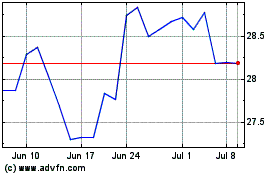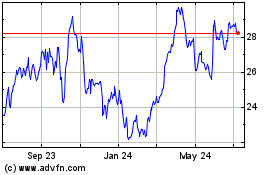By Rebecca Elliott
Texas regulators on Tuesday debated curtailing oil output in the
state in response to cratering demand caused by the new
coronavirus, but it quickly became apparent that the industry was
divided over taking such a historic step.
The virtual discussion by the Railroad Commission of Texas over
whether to limit production -- something the state last did in the
1970s -- attracted numerous oil industry leaders, including the
heads of shale producers Pioneer Natural Resources Co., Parsley
Energy Inc. and Marathon Oil Corp.
While West Texas shale producers Pioneer and Parsley have
spurred regulators to cut production, many larger companies
including Exxon Mobil Corp. and Occidental Petroleum Corp. have
opposed the idea.
No immediate decision was expected Tuesday, when U.S. benchmark
oil prices fell roughly 10% to $20 a barrel as concerns over
oversupply grew. Over the weekend, a coalition of countries
including Saudi Arabia and Russia agreed to reduce output by 9.7
million barrels a day, but many believe that won't be enough to
address lost demand as people stay home due to the pandemic
Pioneer Chief Executive Scott Sheffield urged the state to
reduce daily oil output by one million barrels in May, or nearly
20% from January levels.
"Nobody wants to give us capital because we have all destroyed
capital and created economic waste," Mr. Sheffield said. "If the
Texas Railroad Commission does not regulate long-term, we will
disappear as an industry like the coal industry," he said.
Marathon Oil Chief Executive Lee Tillman urged commissioners to
allow companies to chart their own paths.
"Supply-and-demand imbalances will always occur, and in those
times, some companies will succeed and others will fail," said Mr.
Tillman. "What will be the threshold to toss aside free-market
principles in the future?"
He suggested that the federal government could support the
oil-and-gas industry by having the military purchase refined
products such as gasoline or by giving operators more flexibility
to suspend production on drilling leases.
Jim Teague, co-chief executive of pipeline company Enterprise
Products Partners LP, questioned the motivations of the companies
pushing for the railroad commission to order cuts, though he didn't
name the firms.
"Are they really trying to fix a problem, or do they want to
argue that government action by you gives them the opportunity to
get out of some of their obligations?" Mr. Teague said.
U.S. antitrust laws limit the federal government's ability to
curtail oil production, but Texas empowers its railroad commission
to do so independently when production exceeds market demand.
At the heart of Tuesday's debate was whether the current
situation amounted to a wasting of Texas oil resources, a condition
regulators struggled to define after decades of not imposing
curtailments.
Commission members spent the early hours of the hearing asking
executives how proration, as the output cuts are known, would help
to bring supply and demand back into balance and how they envision
implementing cuts, as well as what constitutes wasting oil.
Some of the panel's three elected commissioners have expressed
reservations about forcing production cuts.
"The Railroad Commission of Texas has the power to limit oil
production but the president does not, and that's kind of a
sobering responsibility we find ourselves holding," Chairman Wayne
Christian said at the hearing's outset. "Despite my reservations on
this limiting, I am open to discussion."
The threat of unemployment in the industry loomed large over the
hearing, with opponents and supporters of output cuts both arguing
that jobs would be lost if the wrong decision were made.
Diamondback Energy Inc. finance chief Kaes Van't Hof said the
free market is working and that his company has positioned itself
to operate through economic cycles. But he said Diamondback would
cease all activity if the commission were to implement cuts.
"Diamondback will not be using any service providers to drill,
complete or produce wells during the proration period," he said,
warning of "a sector with zero revenue and zero employment."
Parsley Chief Executive Matt Gallagher, who supports cuts,
warned of steep job losses if regulators don't intervene. He said
Texas ought to pursue temporary cuts and potentially revisit them
if other producers don't follow suit with additional
reductions.
"This pandemic storm has now been on our shores for over a
month. There is no reason to run full speed into infrastructure
gridlock," Mr. Gallagher said.
Other oil-producing states are also weighing whether to take
steps to address the oil glut. Oklahoma regulators are set to hold
a hearing May 11 to consider limiting the state's oil output.
Regulators in North Dakota, the second-largest U.S. oil-producing
state, have not "looked seriously" at proration, Lynn Helms,
director of North Dakota's Department of Mineral Resources, said in
a Tuesday presentation.
--Collin Eaton contributed to this article.
Write to Rebecca Elliott at rebecca.elliott@wsj.com
(END) Dow Jones Newswires
April 14, 2020 18:05 ET (22:05 GMT)
Copyright (c) 2020 Dow Jones & Company, Inc.
Marathon Oil (NYSE:MRO)
Historical Stock Chart
From Mar 2024 to Apr 2024

Marathon Oil (NYSE:MRO)
Historical Stock Chart
From Apr 2023 to Apr 2024
